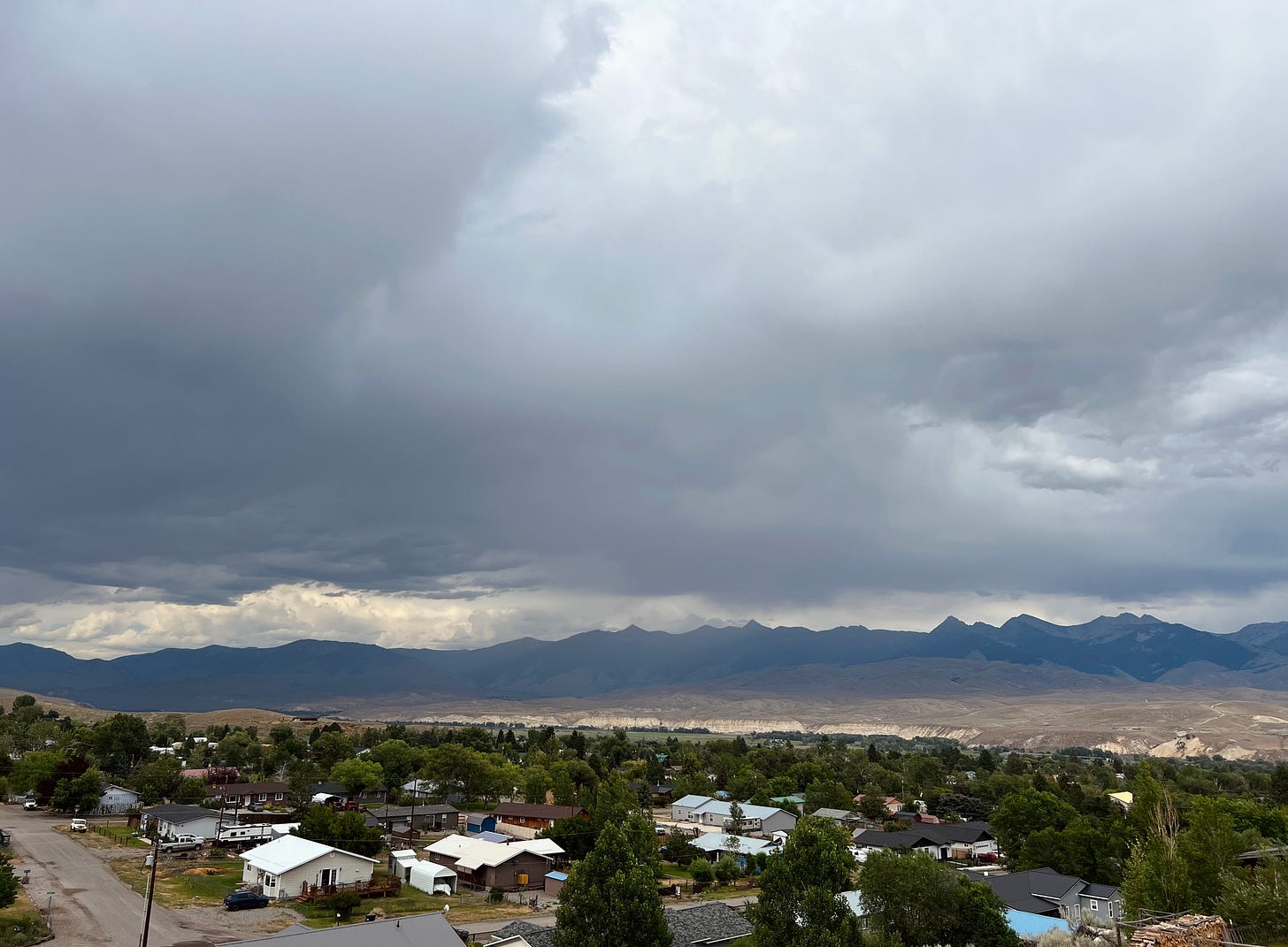New name, musings, and my favorite recent reads.
"When you peer down into the deepest recesses of matter or at the farthest edge of the universe, you see, finally, your own puzzled face looking back at you."
It’s the Fourth of July but I don’t feel like celebrating.
I am in Salmon, a small town in Idaho near the border to Montana. The town is framed by two mountain ranges. The climate is semi arid — dry and sunny, barren hills covered in sagebrush. Glorious sunsets. Sometimes smoke from a brushfire hangs over the valley.
3,000 people. The nearest city in every direction is some two hours away. Nothing much to do but enjoy nature and sit with one’s thoughts. No distraction from one’s demons.
It’s the Fourth of July and I don’t feel like celebrating.
I light a stick of incense and watch the smoke curl. After overdosing on Twitter, I feel anxious and depressed about the state of the country. I wonder if it’s smart to be around this chaotic downward slope. I sit with my lack of answers.
When you peer down into the deepest recesses of matter or at the farthest edge of the universe, you see, finally, your own puzzled face looking back at you. — John Horgan, Physicist John Wheeler and the “It from Bit”
When it looks like the world is spinning out of control,
When the ground begins to shift,
When foundations crumble,
When the widening gyre fills with alligators,
When the air aches,
Can we accept ourselves as merely human?
Can we sit with our fear, anger and sorrow?
We can’t fix what is wrong nor heal those who hurt.
Can we accept our limitations and tolerate our exhaustion?
If we feel numb and exhausted, can we resist the urge to distract ourselves?
Can we give ourselves permission to feel the nausea of being stuck on a ride accelerating on fraying rails?
We create the feeling we’re trying to avoid in the way we’re trying to avoid it. — Joe Hudson
I watch the smoke and make a mental note to keep the phone off in the morning.
I did an unreasonable thing and changed the name of the Substack again. What started out as Neckar, my Twitter handle and hometown river, is now simply ‘Frederik journals’. It’s closest to what I am doing: write about my strange journey from finance to writing, down a spiritual rabbit hole, through a dark night of the soul, and back.
I write about what I wrestle with. The struggle to have a healthy relationship with money (neither idol nor demon). The intersection of creativity and healing: mind-body journaling, voice, and movement. Lastly, my surrender experiment, the search for a life filled with love, wonder, and adventure.
I managed to change the domain without breaking all links, but you might have missed the latest piece on making friends with your authentic voice (and having lots of fun with it!).
I am interested in writing that is authentic, in personal truth that touches the soul and leads the mind to the heart. What could be more important in an age of AI-generated content, when what we read, watch, and listen to is turning into a nightmarish soup of soulless sameness?
I have no idea where my journey is going, but this search for the soul still feels deeply important. Sometimes I feel like I get a glimpse out here in the West, away from the vitriol and the madness. But there is no hiding from history.
— Frederik
Things I enjoyed reading recently
I didn’t read much in June. I just wanted to be with the land. I’ve been catching up and have been in awe at the writing that is emerging on Substack. I will share a few favorites below. If you’ve found new favorite writers, give them a shoutout and leave a comment!
Be sure to catch the piercing The False Gods of Our Feeds by my friend Rohan Routroy.
An illustration of this is the ever-growing epidemic of doom scrolling, which, in my view, is the nihilistic turn of our intrinsic desire for transcendence. Let us look at these two gestures.
It is the same repetitive motion of flicking the thumbs - a motion that has been around for millennia. But for the first time in our existence, the rosary bead has been replaced by the endless scroll of the feed, which farms our attention to anoint the gods of our era.
While the action might look similar, the desire behind it is fundamentally different...
Tom Morgan had a wonderful conversation about “the importance of attuning to resonance” (to Access Evolutionary Intelligence). “The stickiest idea I've ever encountered,” he writes, “was about sticky ideas themselves. Carl Jung's belief that your future self beneficially directed your evolution by influencing what you were interested in in the present.”
I have a small journal for meaningful dreams next to my bed. I loved the idea of having another journal for a brief moment of “taking dictation from the divine.” I use my morning pages notebook, so far with mixed results. Sometimes I catch the liminal space, other mornings my mind spins up into thinking mode at breakneck pace.
Anyway, the idea is straight out of the creative night shift playbook.
In the morning when you wake-up, while still in this liminal space, reach out and write down everything that you're feeling, hearing, knowing and sensing without editing or interpreting. She describes this as “taking dictation from the divine;” writing with a pure, unfiltered stream of consciousness. Next, observe what insights have been revealed. This helps to map the patterns of this broader intelligence. And then it’s about engaging your rational mind and putting them into action.
Many of history's great geniuses and visionaries did everything they could to maximize this powerful state of expanded awareness.”
I was introduced to an incredible writer, Taylor Foreman. His I Want to Be a Hero was my favorite essay in a long time. I could not stop highlighting.
“Nothing is as important as a likable narrator,” Anne Lamott quoted Ethan Canin. Taylor does this well, first painting the picture of a boy wandering the strange landscape of America. Then he takes a deep dive into making sense of the world. By the end of the piece, my world view feels enriched and I am invested in how his life plays out.
We say things like “dopamine trap” or “doom scrolling” or even “the meaning crisis” when we try to talk about these hyperpredators. These descriptions are like ancient man’s mythical drawings of griffins and dragons. Parts of the whole, glimpsed in flashes, and clumsily portmanteau’d. The only hope to be a hero in this hyperlandscape is to see them in their wholeness, for what they really are.
We are in an ocean of titanic monsters. A little boat, no sail, no rudder. Why? Practically, because someone wants your money and your eyeballs. But what spirit are those men serving? The hyperpredators, who steal your misplaced meaning. They wear your desires like costumes. They live in dark UX patterns designed to addict, in ideologies that demand all your blind allegiance, or in success stories that would leave you spiritually bankrupt. All the alignment I need to be a hero is being consumed and scattered by these spiritual parasites.
I also loved his Why I am Christian again, the story of a spiritual journey plus Ken Wilber’s framework of consciousness.
Returning home with a deeper understanding of my origins was what I was yearning for but didn’t know how to ask for.
Taylor introduced me to Peter Putnam, a forgotten physics genius who “believed consciousness bootstrapped itself by resolving internal contradictions.”
All of our consciousness scaffolds upward like this through induction, with ever-increasing complexity. There are no algorithms. We are always in dialectic between contradictory “mythologies.” Not just during development, but in the fate of our lives, our relationships, and even the frontier of our scientific institutions. You must always pass many small odysseys into chaos, always searching for that mysterious higher synthesis.
“We know things in the act, not in their essence.” – Peter Putnam
Putnam himself was a contradiction. He shrewdly invested his family’s money yet worked as a janitor and lived with his partner in rural Louisiana. When he died, he left $40 million to conservation.
There is a fascinating profile of the woman who sifted through his files: The forgotten janitor who discovered the logic of the mind
“It’s easy to say why someone is wrong,” Putnam said. The hard part is figuring out why they’re right.
And everyone is right. Everyone has some central insight, hard won by the consistency-making mechanism of the brain, built of past experiences, cast as motor predictions, a pattern that repeats, sustains itself in the chaos. Our job is to pan for it like gold, sift it into our own nervous systems, reconcile the resulting contradiction, become something new.”
What else . . .
Paul Kingsnorth with a charming road trip piece and a reflection on what it feels like to be a writer.
“In my house, I have a reputation for wandering around muttering to myself underneath my breath. Usually I’m either engaged in a fictitious argument with a fictitious interlocutor or I’m composing a paragraph about something which I’ll later have to write down.
It’s an unhealthy lifestyle, this; a compulsion, really, disguised as a vocation. The muttering is what happens when concepts and words start to cannibalise your brain, and that in turn is what happens when you live by a compulsion to record everything about your life in words, before it slips away.”
I read Randall Sullivan’s book The Devil's Best Trick, an exploration of the devil in history (and in the author’s firsthand experience as a crime reporter. Does everything boil down to biology/psychology (humans being human) or is there such a thing as ‘evil forces’?
One fascinating motif was that of the deathbed conversion and confession.
Mexico’s most famous brujo (sorcerer/witch) at the time predicted his death to the day. He spent the last ninety days of his life making “confession every day . . . because he was determined to redeem his soul from the pact he had made with the Devil.”
Rod Dreher discussed the book:
That’s the big takeaway of The Devil’s Best Trick: There is no middle ground. There is a spiritual war going on, one that has been happening since the beginning of time, and that you must choose sides. There are a thousand and one reasons why we talk ourselves out of facing the realities of spiritual evil, but it remains there — and you cannot compromise with it.
Also . . .
Neal Stephenson revisits an idea from his sci-fi novel The Diamond Age: self-reliance, ambition, and agency in the age of AI: Emerson, AI, and The Force.
If AI-driven education does nothing more than make students even more reliant on AI, then it’s not education at all. It’s just a vocational education program teaching them how to be of service to AIs.
Isik Tlabar wrote about a question I face again and again: How to Know the Difference Between Your Mind and Your Intuition. Highly recommend both the piece and practicing inner listening.
Bodhi on The Most Powerful (and easiest) Spiritual Practice I've Found
And Wisdom School: The Physics of Prayer: What Quantum Mechanics Suggests About the Power of Intention
“Prayer isn’t merely saying words. It is a state of consciousness—an alignment of mind, heart, and spirit. In many traditions, this state is deepened through ritual: incense, chants, candlelight, posture, sacred texts.
These aren’t just religious relics—they’re technologies for tuning consciousness.“




